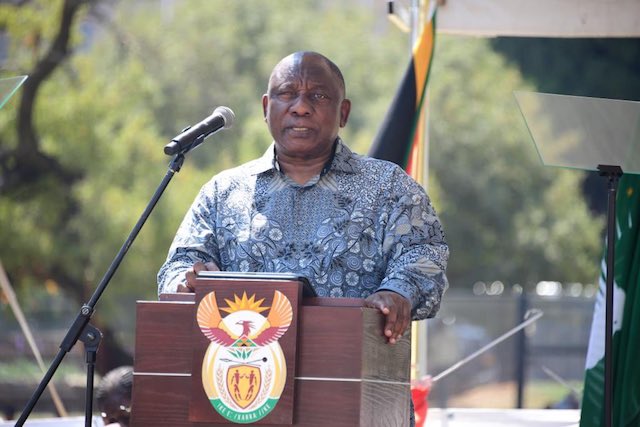Cape Town – In his latest letter to South Africans from the desk of the President, Cyril Ramaphosa has praised the Presidential Employment Stimulus which was launched in order to create jobs and support livelihoods as part of supporting the economic recovery from the Covid-19 pandemic.
Ramaphosa said that the initiative has reached the milestone of one million participants reached since its inception.
He said that despite this achievement, the programme is still very much needed to complement the recovery of the job market.
He called on businesses to hire the young people with newly-acquired work experience as a result of the Presidential Employment Stimulus.
Read the statement below:
A MILLION WORK AND LIVELIHOOD OPPORTUNITIES, AND COUNTING
Dear Fellow South African,
Less than two years ago, we launched the Presidential Employment Stimulus to create jobs and support livelihoods as part of supporting the economic recovery from the COVID-19 pandemic.
The Presidential Employment Stimulus has just reached the milestone of one million participants reached since its inception.
This achievement is the result of a collaborative effort across government and the wider society, including the private sector, community-based organisations and many others.
The programme is contributing to employment creation while the economy takes time to create recover and create jobs at the scale we need.
As we pursue economic growth to deliver decent and sustainable employment at a much larger scale, we will continue to build on the success of the Presidential Employment Stimulus and expand its reach. It is still very much needed to complement recovery of the job market. It also supports that economic recovery in important ways.
In a context where a lack of work experience is a major barrier to finding work, these programmes are providing high-quality work experiences.
ALSO READ | King Charles III to host SA President Cyril Ramaphosa in first state visit of reign
In the largest programme supported by the stimulus, for example, nearly 600,000 young people have been placed as school assistants in over 22,000 schools in every corner of the country. School management, teachers and other stakeholders all agree that the contribution of the school assistants has improved the learning environment in schools.
Many self-employed people found their livelihoods disrupted by the pandemic. The creative sector was particularly badly affected. In this sector, support was provided to people to create jobs for themselves and others. The movies, music and plays produced are now able to generate further income from the sale of rights, tickets and royalties. All of this has been contributing to the growth of the sector.
The Presidential Employment Stimulus has also supported sustainable livelihoods. Over 140,000 subsistence farmers have received production input vouchers to assist them to resume and expand production after the disruptions of COVID-19.
One such beneficiary is 36-year-old Phindile Ngcoya from Richmond in KwaZulu-Natal. She is one of ten members of a family farming cooperative and says the voucher she received helped the new cooperative survive and become profitable.
The Presidential Employment Stimulus is also supporting graduates, with opportunities provided to nurses, science graduates, artisans and others. Twenty six universities are helping to place unemployed graduates in work relevant to their qualifications.
ALSO READ | WATCH | Load shedding briefly disrupt President Cyril Ramaphosa’s speech
The Department of Science and Innovation has introduced a range of innovative citizen science programmes, such as the Duzi uMngeni Conservation Trust, which employs local youth as Enviro-Champs to empower communities to rehabilitate local water sources. Another programme by the department helps entrepreneurs to develop business proposals in the green economy.
Public employment programmes also have a direct positive impact on communities because they create work for the common good. In the case of the Presidential Employment Stimulus, this includes improving learning in schools, upgrading informal settlements, supporting survivors of gender-based violence, environmental conservation and innovating in waste-recycling.
The Presidential Employment Stimulus was launched in response to the unemployment crisis that was deepened by the COVID-19 pandemic. Although the pandemic may have abated, unemployment has not.
The incomes earned in Presidential Employment Stimulus programmes have been an economic boost to small enterprises and informal businesses in local economies across the country. School assistants employed in Umgungundlovu are spending their wages in Umgungundlovu. The same in Putsonderwater.
Instead of the ‘trickle down’ effect, money is being put directly into the hands of communities that need it most. That money then circulates locally and ‘trickles up’ into the wider economy.
That is why we call it a stimulus, because the entire economy benefits along with society.
ALSO READ | ‘Unfortunate reality’ – Cyril Ramaphosa says ‘no quick fix to load shedding’
Through the Presidential Employment Stimulus, we have unlocked energy, commitment, creativity, innovation and opportunities. In the process, we are building a society that works.
Over one million people have benefited directly. Many more people, in the families and communities of participants, have felt the impact of the Stimulus.
Our task now is to expand and deepen the impact of this work.
As a result of the Presidential Employment Stimulus, we now have hundreds of thousands of people with valuable work experience. Most of these people are easy to find through the SAYouth.mobi platform.
We call on business to hire these young people with newly-acquired work experience as they leave these programmes.
Once employers see the Presidential Youth Stimulus as a place to find young talent, then we will be able to realise the full potential of this innovative and hugely successful initiative.
With best regards,

Follow African Insider on Facebook, Twitter and Instagram
Picture: Twitter/ @PresidencyZA
For more African news, visit Africaninsider.com
Compiled by Junaid Benjamin


